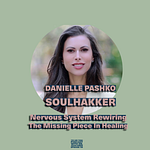“Every time you have a viral infection, including those that might not clear, the metabolic output of your mitochondria inevitably changes. These pathogens hijack energy production, shift metabolism, and create a low-energy state that underlies many chronic illnesses.”
— Dr. Amy Proal, Episode 117 of The One Thing Podcast
In this episode, I sit down once again with Dr. Amy Proal, microbiologist and co-founder of the PolyBio Research Foundation, to discuss one of the most provocative ideas shaping the future of chronic illness care: the role of persistent infection.
We explore how chronic viruses, bacteria, parasites, and fungi may evade the immune system, linger in the body’s tissues and nerves, and gradually drive conditions like:
Long COVID
Alzheimer’s disease
POTS and autonomic dysfunction
Chronic fatigue syndrome (ME/CFS)
Neuropsychiatric and cognitive disorders
Dr. Proal explains the mechanisms by which microbes hijack mitochondria, disrupt immune signaling (including interferons and T-cell function), and rewire cellular metabolism toward a state of low energy and chronic inflammation.
Topics we cover:
Why Alzheimer’s plaques may form in response to infection
How the vagus nerve becomes a conduit for neurotropic viruses
Mitochondria as immune organelles—and how they’re disrupted
The potential of low-dose rapamycin to support immune rebalancing
Why supporting immune function (not suppressing it) is the future of treatment
This conversation is a paradigm shift. If you work with patients, live with complex chronic illness, or are searching for root-cause answers, this episode offers a compelling new lens.
Full Show Notes:https://www.onethingpod.com/episode-117-the-hidden-microbial-drivers-of-chronic-illness-with-dr-amy-proal/
Learn more about Dr. Amy Proal’s work:
https://www.polybio.org













